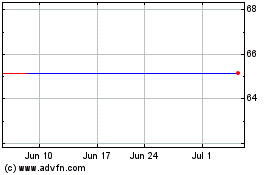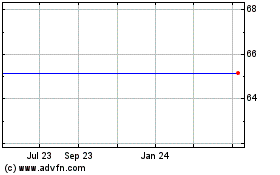US Coal Miners Set To Profit As Fears Rise Over Nuclear Power
March 18 2011 - 6:31PM
Dow Jones News
U.S. coal companies are poised to benefit from a move away from
nuclear energy because of concerns raised by the severe crisis at
reactors in Japan.
More coal from the Appalachian mountains in the eastern U.S.
will be routed to European power plants to replace an electricity
shortfall in Germany, which this week issued a three-month ban on
operations at seven old nuclear reactors. Germany's move is part of
a broad backlash against nuclear power after last week's earthquake
and tsunami crippled Japan's Fukushima Daiichi nuclear facility,
where spent fuel is emitting radiation.
Additional coal will also have be diverted from Europe as
Japan's nuclear capacity remains offline.
Coal miners that export from East Coast facilities--such as
Consol Energy Inc. (CNX), Alpha Natural Resources Inc. (ANR), Arch
Coal Inc. (ACI) and Patriot Coal Corp. (PCX)--now have the chance
to fill the gap as Europe's traditional suppliers from South
Africa, Russia and Colombia have redirected shipments to Asia to
meet burgeoning demand there.
"The market looks pretty good for Europe for the longer term,"
said Dan Zajdel, vice president of investor relations for Consol,
which has around 20 million tons of export capacity at ports in
Maryland and Virginia. "It could be very profitable for us to ship
over there."
The company is determining how much coal it will sell in
longer-term contracts to its European customers and how much it
will offer to the market for immediate delivery, Zajdel said.
Such one-time deals that are struck for the short term are
becoming increasingly lucrative amid the nuclear shutdowns in Japan
and Germany. Coal for power plants in Europe has jumped to $132 a
metric ton from $123 prior to the disaster, according to a note
from brokerage Stifel Nicolaus. Prices on the New York Mercantile
Exchange have risen above $75 a ton, from $71.
This year, Patriot Coal has already booked about a million tons
of thermal coal destined for Europe, compared with almost no
thermal exports last year, said Janine Orf, Patriot's director of
investor relations. The company ships out of ports in Maryland,
Virginia and Louisiana.
"We are getting more interest," Orf said.
The additional bump in power generating coal demand after the
Japan disaster comes as foreign consumption of U.S. coal has
already been rising. Recent flooding in Australia has crimped
exports from there, and the so-called thermal coal is increasingly
needed amid the global resurgence in manufacturing.
As nuclear-generated electricity production wanes, coal and
natural gas are the only alternatives at the moment that can pick
up the slack.
"We expect the increased reliance on thermal coal will likely
encourage more exports out of the U.S., especially on the East
Coast," said UBS analyst Shneur Gershuni.
Total U.S. exports of thermal coal could jump 29% to 33.3
million tons this year, UBS estimates. The figure could grow
another 27% to 42.2 million in 2012.
"We think that nuclear power is going to take a step back," said
Shawn Reynolds, portfolio manager of Van Eck Global Hard Assets
fund. "We are definitely expecting thermal coal to pick up."
Japan already imports around 120 million tons of thermal coal a
year and will probably have to take an additional 5 million to 10
million tons this year while its nuclear plants remain shuttered,
Gershuni said.
That means less coal will be available to other regional
consumers like China and India, creating a ripple effect where some
of the global 700 million tons of thermal coal will be diverted
from Europe to Asia.
Ultimately, U.S. producers could ship an additional 5 million
tons across the Atlantic Ocean, said Jefferies & Co. analyst
Michael Dudas.
"It looks like the U.S. is going to be the swing supplier to
Europe," Dudas said.
-By Matt Whittaker, Dow Jones Newswires; 212-416-2139;
matt.whittaker@dowjones.com
Massey (NYSE:MEE)
Historical Stock Chart
From Aug 2024 to Sep 2024

Massey (NYSE:MEE)
Historical Stock Chart
From Sep 2023 to Sep 2024
